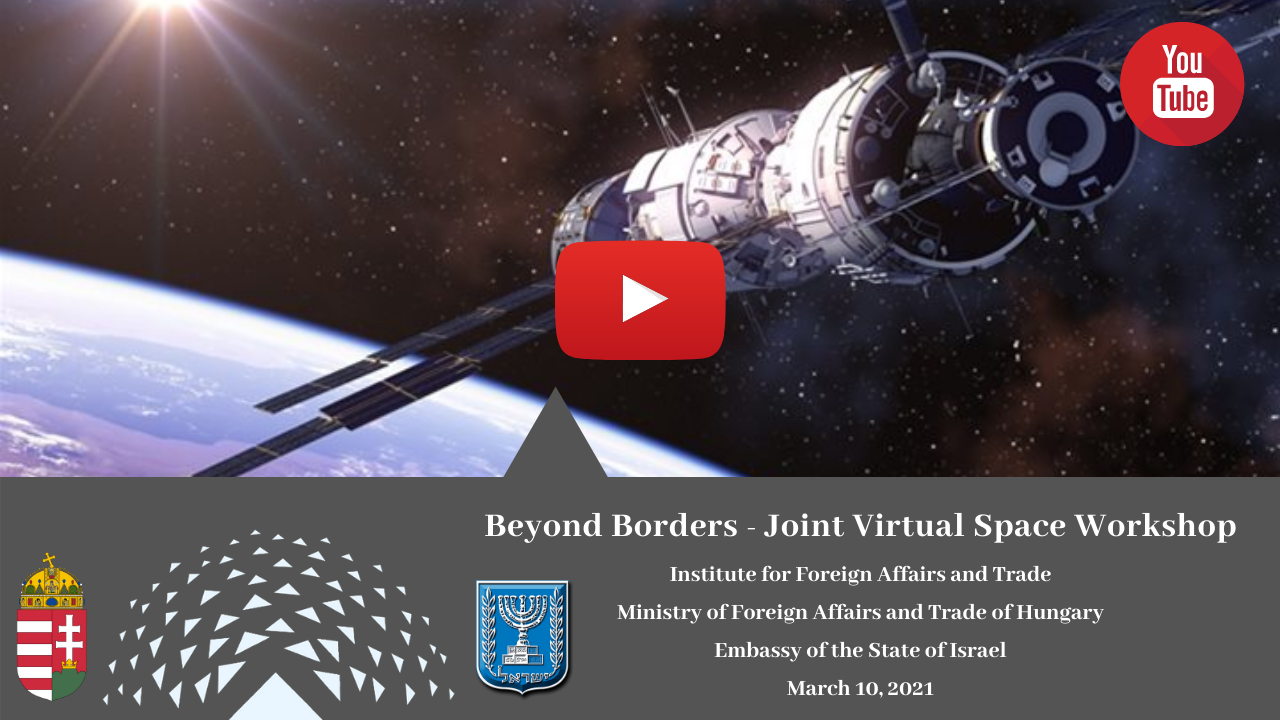The Institute for Foreign Affairs and Trade (IFAT), the Hungarian Ministry of Foreign Affairs and Trade and the Embassy of the State of Israel jointly organized an online event titled “Beyond Borders – Joint Virtual Space Workshop between the MFA Department for Space Activities and the Embassy of the State of Israel” on 10th March 2021. The online workshop was moderated by Nikolett Garai, Research Fellow, Project Coordinator at IFAT.
H.E. Yacov-Hadas Handelsman, Ambassador of the State of Israel briefly introduced the history of Israel’s space program in his opening remarks. Ambassador Handelsman highlighted the importance of Israeli-Hungarian academic cooperation in space activities and joint future projects.
Dr. Orsolya Ferencz, Hungarian Ministerial Commissioner for Space Research welcomed the progress made in the past eight months, since the Declaration of intent concerning cooperation in the exploration and use of outer space was signed between Hungary and Israel. Dr. Ferencz told that space activity is an integral part of the Hungarian economic portfolio. Investment into R&D industries helps preserve economic competitivity, as these industries are more resistant to external crises.
Avi Blasberger, Director of the Israeli Space Agency presented the diverse activities of the Agency. Mr. Blasberger told the participants that even though the civilian participation is very important in Israeli space activity, the Agency’s activities are based both on defence and commercial heritage. Mr. Blasberger presented the most important past and present Israeli satellite programmes oriented towards environment monitoring, space observation and Moon exploration, such as the VENUS, BERESHEET and SHALOM programmes.
David Szesztai, Head of the Space Department of the Hungarian Ministry of Foreign Affairs presented the history of Hungarian space activity. Mr. Szesztai expalined that due to the highly globalised nature of the sector, the domain of space now belongs to the competences of the Ministry of Foreign Affairs and Trade. Hungary has been a member of the ESA since 2015 and has since then multiplied its contributions to the agency’s funding. Besides the European multilateral cooperation, Hungary’s most important bilateral space partners include Russia, Brazil, Singapore, France and Israel. Amongst the most important fields of Hungarian contribution to space science, Mr Szesztai mentioned equipment engineering. BepiColombo, JUICE and ExoMars are the most important missions with Hungarian participation.
Edina Németh, Researcher at the National Research Development and Innovation Office and Zsuzsanna Tandi, Representative of the Horizon Europe programme’s Space cluster talked about the importance of the Horizon Europe program in collaborative space research between the Member States. The programme recently allocated 504,9 million euros for the development of global space-based infrastructures, highlighting the relationship between space and the digital and green transition priorities of the Commission.
Mr. Dan Seker, Director of ICT at the Israel-Europe R&D Directorate at the National, Research, Development and Innovation Office presented the structure of the Israeli space programme’s funding. Mr. Seker told the participants that Israeli national expenditure on research and development is one of the highest amongst the OECD countries. Artificial Intelligence, quantum and bioconvergence are the major areas that are expected to be the engine of future Israeli R&D growth national programs. As Israel’s acces to European funding is fairly limited, bilateral cooperation with European countries is very important. The 8th bilateral Hungarian-Israeli innovation programme will soon be launched.
Yossi Yamin, CEO of Spacepharma (ISR) – and Prof. Ferenc Darvas, CEO of Thalesnano (HU) introduced the cooperation on space projects between the two companies. The project covers high pressure, high temperature biochemical experiments relevant for space exploration. The joint project contributes to the European Space Agency’s Space Rider programme at a lower cost. Thalesnano recently carried out the first anti-COVID drug research in space. The company’s space chemistry activities also extend to the agro and cosmetics field.
Dr. Levente Dudás, Assistant Professor at the Budapest University of Technology presented the activities of the university’s Department of Broadband Infocommunications and Electromagnetic Theory. The University has participated in space research since the 1970s and different small sized sattelites have been designed by Hungarian students.
Prof. Pini Gurfil of the Israeli Technion University’s Asher Space Research Institute presented the past, current and planned collaborations of the Institute. Besides the lunar landing mission and the distributed systems lab, Professor Gurfil highlighted the Institute’s work in space telescopes design.
The full recording can accessed at the link below or on our YouTube-channel!
JTNDaWZyYW1lJTIwd2lkdGglM0QlMjIxMDAlMjUlMjIlMjBoZWlnaHQlM0QlMjI0NTAlMjIlMjBzcmMlM0QlMjJodHRwcyUzQSUyRiUyRnd3dy55b3V0dWJlLmNvbSUyRmVtYmVkJTJGZ3ZkNVpFX3h4dlklMjIlMjB0aXRsZSUzRCUyMllvdVR1YmUlMjB2aWRlbyUyMHBsYXllciUyMiUyMGZyYW1lYm9yZGVyJTNEJTIyMCUyMiUyMGFsbG93JTNEJTIyYWNjZWxlcm9tZXRlciUzQiUyMGF1dG9wbGF5JTNCJTIwY2xpcGJvYXJkLXdyaXRlJTNCJTIwZW5jcnlwdGVkLW1lZGlhJTNCJTIwZ3lyb3Njb3BlJTNCJTIwcGljdHVyZS1pbi1waWN0dXJlJTIyJTIwYWxsb3dmdWxsc2NyZWVuJTNFJTNDJTJGaWZyYW1lJTNF

